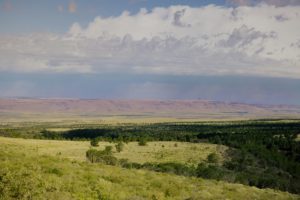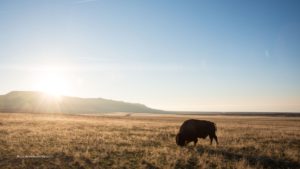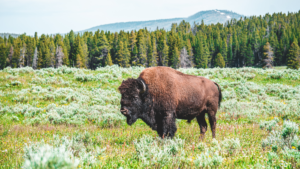For immediate release: October 28, 2024
Media contacts:
- Megan Backsen, Western Watersheds Project, (719) 207-2493, megan@westernwatersheds.org
- Jennifer Schwartz, WildEarth Guardians, (503) 780-8281, jschwartz@wildearthguardians.org
- Matt Sandler, Rocky Mountain Wild, (303) 579-5162, matt@rockymountainwild.org
- Erik Molvar, Western Watersheds Project, (307) 399-7910, emolvar@westernwatersheds.org
Court Strikes Down Wyoming National Grassland Plan to Kill Prairie Dogs, Eliminate Black-Footed Ferret Restoration
DENVER – Today, conservation groups scored a major victory for endangered black-footed ferrets and black-tailed prairie dogs on Thunder Basin National Grassland in northeastern Wyoming. The Tenth Circuit Court of Appeals ruled that the U.S. Forest Service failed to adequately analyze alternatives or justify its decision to expand lethal control measures against prairie dogs—the essential prey of the endangered black-footed ferret.
“Prairie dogs are a vital and irreplaceable component of grasslands that many other species, including endangered black-footed ferrets, rely on for their survival,” said Megan Backsen, staff attorney with Western Watersheds Project. “We are very pleased that the Court recognized what the Forest Service overlooked: that increasing the killing of prairie dogs, reducing protected habitat, and ceasing plague treatment directly threatens the survival of this keystone species on the Thunder Basin grassland.”
“The Forest Service should be ashamed of their plan to use shooting, poisoning, and unmitigated plague outbreaks to crush populations of native wildlife for the benefit of livestock grazing and local ranchers,” said Matt Sandler, Legal Director with Rocky Mountain Wild. “We are pleased that the Court has held the Forest Service to its duty to consider how it’s actions will impact species, especially the federally endangered black-footed ferret and the agency-listed sensitive species black-tailed prairie dog.
Spanning 553,000 acres of federal public lands, Thunder Basin National Grassland is recognized as a vital reintroduction site for the black-footed ferret—a species once abundant across the plains but nearly eradicated by prairie dog extermination campaigns promoted by the livestock industry and its allies in government. Successful reintroduction of the ferret depends on the existence of robust prairie dog colonies for the ferret’s prey and habitat.
“Despite being federally protected for over 50 years, black-footed ferrets remain the most critically endangered mammal in all of North America, with their recovery in the wild completely dependent on the federal government reintroducing them to native grasslands that are purposefully managed to preserve large, intact prairie dog colonies,” said Jennifer Schwartz, Senior Staff Attorney with WildEarth Guardians. “It’s great that the Court recognized the immense value Thunder Basin holds for future ferret recovery.”
Since 1981, the Forest Service has preserved part of Thunder Basin as a black-footed ferret reintroduction area. In 2002, the agency issued a Grassland Plan establishing a 50,000-acre area closed to prairie dog shooting, with a ban on prairie dog poisoning except in limited circumstances. Subsequent plan amendments all underscored the critical role of black-tailed prairie dog colonies for both ferret recovery and other species reliant on these ecosystems.
However, in 2020, the Forest Service reversed course, adopting a new plan amendment that eliminated prairie dog conservation, removed black-footed ferret habitat protections, ceased sylvatic plague control—a disease that reduced Thunder Basin’s prairie dog population from 75,000 in 2017 to only 1,100 in 2018—and radically expanded prairie-dog shooting and poisoning throughout the Grassland.
The Court found that the Forest Service failed to consider any alternatives prioritizing conservation, noting that the agency did not adequately assess “the combined effects of reduced acreage, density control, poison, plague and shooting,” which it had previously admitted could lead to “the eradication of prairie dog populations on Thunder Basin.” The court also criticized the agency for narrowing the plan’s scope to only those alternatives that increased lethal control of black-tailed prairie dog colonies.
The Circuit Court has remanded the agency’s decision to the Wyoming District Court to determine the final remedies for the unlawful plan amendment.
###






